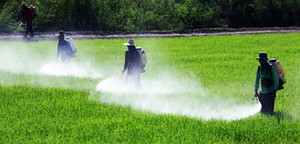Conventions on chemical pollutants
In this section, we will look at two conventions on specific chemical pollutants that are of international concern because of their particular characteristics.
Stockholm Convention on Persistent Organic Pollutants
Persistent organic pollutants (POPs) are chemicals produced by industrial processes, mostly for use as pesticides (Figure 14.5). You may recall from Study Session 8 that POPs are characterised by high toxicity and persistence (lasting for years or even decades before degrading into less dangerous forms). They are also highly mobile in the environment because they may evaporate or dissolve and travel long distances through air or water. They also bioaccumulate in fatty tissues and biomagnify in the food chain. The Stockholm Convention was adopted in 2001 to restrict the production of POPs, eliminating the most dangerous, and to clean up stockpiles and equipment containing POPs. Many POPs contain chlorine in their composition. Examples are aldrin, chlordane, DDT, heptachlor, and hexachlorobenzene. Many of these pesticides are now banned.

Figure 14.5 Pesticide application in East Africa.
What is the difference between bioaccumulation and biomagnification?
Bioaccumulation is the increase of a pollutant in an individual plant or animal because of continued exposure. Biomagnification is the increase of the pollutant in organisms through a food chain. (You learned about bioaccumulation and biomagnification in Study Session 8.)
Minamata Convention on Mercury
This convention’s name comes from the Japanese town that you read about in Study Session 8 where mercury poisoned many of the local population. The convention deals with mercury use and handling with the purpose of reducing and preventing its release and bioaccumulation in the environment including water bodies that might be used for drinking. The ultimate goal is to phase out the release of mercury into the environment. This is a new convention that was adopted in October 2013 and is still open for signing by countries. Ethiopia is a signatory to this convention.